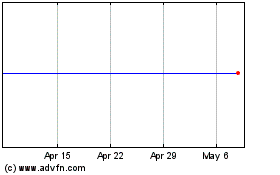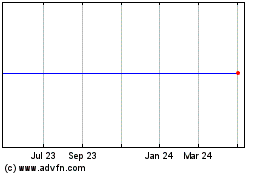By Nora Naughton
After years of prosperity, car companies in Detroit are entering
contract talks this week with the United Auto Workers union with
one main goal: cap fast-rising labor costs ahead of a downturn in
the U.S. auto industry.
Within the past eight years, factory worker costs for Ford Motor
Co., General Motors Co. and Fiat Chrysler Automobiles NV have crept
toward prerecession levels, as the union won pay increases and
other benefits sacrificed during the last downturn while car
companies posted big profits.
This time around, negotiators for the three American car makers
plan to press for concessions on health care and want greater
flexibility using temporary workers, according to people familiar
with their bargaining strategy. GM and Ford also want to address
underused factories with the union as both companies continue to
slash costs and shift more resources into developing electric and
self-driving cars.
Ford, GM and Fiat Chrysler together employ nearly 150,000
UAW-represented workers. All three labor contracts expire Sept.
14.
UAW President Gary Jones said Monday the union won't back down
easily, emphasizing in a speech that it will resist major
concessions while the companies are still making healthy profits.
The union and its members want more permanent workers and job
security for the plants, especially as the car companies stop
production of U.S.-built sedans.
"With this year's negotiations, we will halt that race to the
bottom," Mr. Jones said during an event marking the official start
of labor talks. "We will protect our work, our jobs and our way of
life."
One big wild card in this round of talks: nearly 42% of the
Detroit Three's unionized workforce have never experienced a
slowdown in the U.S. car sector, according to data provided by
industry sources. After the recession, U.S. car sales bounced back,
recording their best four-year period ever, as pricey SUVs
proliferated and padded profits for auto makers.
Negotiators for the companies worry that this group -- many of
whom were hired after 2012 as auto industry rebounded -- will pose
a tougher challenge in terms of predictability because they have
less exposure to economic hard times and aren't as experienced with
the bargaining process, say people familiar with the car makers'
bargaining preparations.
The membership must ratify any contract struck by the union and
company with a 51% majority vote. In the last round of
negotiations, Fiat Chrysler workers voted down the first tentative
agreement before passing the second pact. GM and Ford factory
workers ratified their respective contracts in 2015 with a slim
majority.
Mike Daniels, a factory worker hired at GM in 2013, said he
isn't concerned about the threat of another downturn. He wants
union leaders to fight GM for base wage increases that close the
pay gap between pre- and postrecession workers, as well as pensions
and guaranteed work for plants that GM has proposed to shutter,
such factories in Detroit and Lordstown, Ohio. He said he will vote
down any contract that doesn't include those elements.
"I deserve it," said Mr. Daniels, who recently transferred to a
casting-plant in Indiana after GM downsized production at its
Detroit assembly facility. "I'm standing my ground, and I'm drawing
the line."
GM and Ford's all-in labor costs, including wages and benefits,
have each exceeded $60 an hour for the first time in years,
according to the Center for Automotive Research. Fiat Chrysler's
all-in labor costs now stand at $55 per hour, up from $47 an hour
during the last round of bargaining in 2015, the research center
estimates. By comparison, foreign car companies, which don't have
unionized factories, spend an average of $50 an hour on labor, the
center found.
While labor accounts for only about 5% of the cost of building a
vehicle, it is a crucial cost-saving lever for auto makers as it is
the only component they can control, labor experts say.
Still, many workers want to see greater pay equity among the
rank-and-file, including getting newer workers up to the top wage
faster and winning them the same benefits offered to veteran
employees. The UAW in March moved to raise the strike pay in
preparation for a work stoppage if they can't come to an agreement
with the companies.
"It's a new dynamic for this bargaining relationship," said
Kristin Dziczek, vice president of the Center for Automotive
Research in Ann Arbor, Mich. "This is not a concessionary
environment, but there is a shoe about to drop, and these companies
don't want to get hamstrung with costs they can't absorb if the
industry contracts."
A federal investigation is also hanging over contract talks this
year. A U.S. attorney's office is probing whether former union
leaders and Fiat Chrysler executives corrupted the bargaining
process by misappropriating training center funds in 2015. The
investigation has so far led to eight convictions. The UAW has said
it is reforming, while Fiat Chrysler has said a few bad actors
stole funds for their personal enrichment.
Health care is expected to be a major issue in bargaining with
the companies as they look to press for workers to pay a greater
share of their costs, say people familiar with the bargaining
preparations. Company negotiators also want to reduce fixed costs
by using more temporary workers, these people say.
The companies say they need to address both of these items to be
more competitive with foreign auto makers and shore up their
finances as U.S. auto industry sales slow. GM's plans to idle four
U.S. factories will also loom large in these negotiations with the
union pushing to keep the plants open, while the company has argued
it has too much unused factory space.
Joe Hinrichs, Ford's president of automotive operations, said
the companies need to maintain their competitiveness, regardless of
the industry's health.
"The backdrop of the negotiations is basically we've had a
10-year run of strong economics in the U.S.," Mr. Hinrichs said.
"That doesn't stay on forever."
Write to Nora Naughton at nora.naughton@wsj.com
(END) Dow Jones Newswires
July 16, 2019 09:23 ET (13:23 GMT)
Copyright (c) 2019 Dow Jones & Company, Inc.
Fiat Chrysler Automobile... (NYSE:FCAU)
Historical Stock Chart
From Mar 2024 to Apr 2024

Fiat Chrysler Automobile... (NYSE:FCAU)
Historical Stock Chart
From Apr 2023 to Apr 2024
